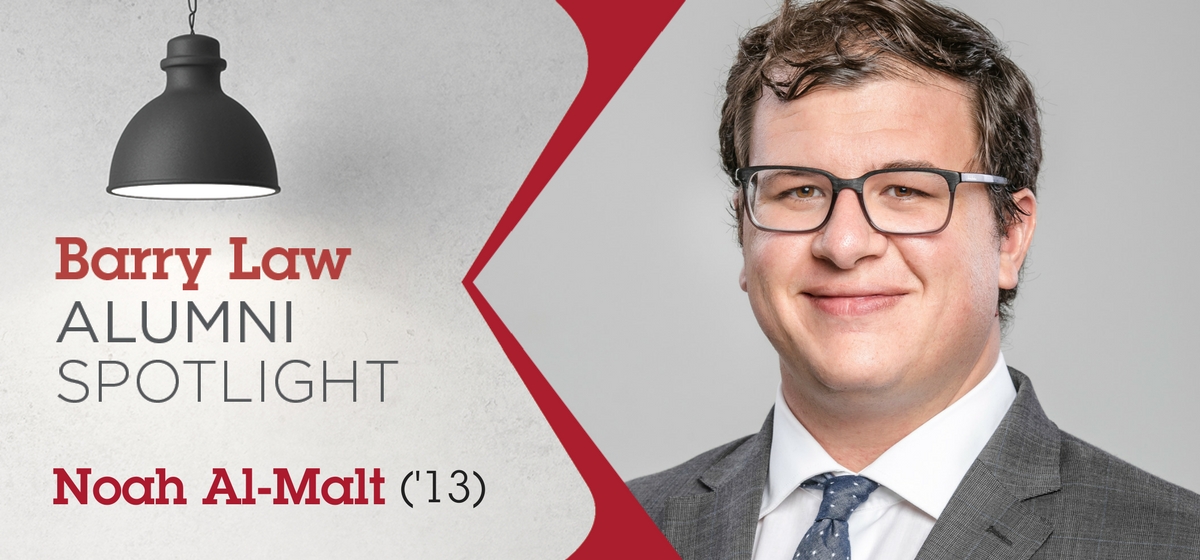Noah Al-Malt ('13): A Journey From Barry Law To International Law
Eleven time zones east of Barry Law School – half a world away, in Cambodia – Noah Al-Malt (2013) is experiencing a legal career that is very different from most Barry alumni. He’s working at the Extraordinary Chambers in the Courts of Cambodia (ECCC), a special court inside the Cambodian judiciary backed by the United Nations, as proceedings unfold regarding alleged international crimes committed by Khmer Rouge senior leaders and those most responsible for atrocities during the Khmer Rouge era. Specifically, Al-Malt is part of a legal team defending a client alleged to have been the Khmer Rouge Navy Commander according to the charging document.
“Working on such a large international case is both interesting and challenging,” says Al-Malt, “as it requires an in-depth understanding of the political, socio-economic and historical conditions of another country.” The ECCC applies both international and Cambodian law as its substantive law, and uses jurisprudence derived from previous international tribunals such as the Post-World War II International and National Military Tribunals, the International Criminal Tribunals for Yugoslavia (ICTY) and the International Criminal Tribunal for Rwanda.
Al-Malt says the case record for this type of international proceeding is huge. It includes several thousands of pieces of documentary evidence, witness statements and testimonies, transcripts, written submissions and decisions.
“I am very fortunate to have the opportunity to do what I do,” says Al-Malt. “The field of international law is a very limited field, with a limited number of players.”Barry Law Experience
Al-Malt’s journey toward working in Cambodia was greatly influenced by his undergraduate and Barry Law experiences. After earning a B.A. in Linguistics from the University of Florida, Al-Malt accepted a scholarship from Barry Law. “When I applied to law school, I did not realize the utility of linguistics regarding the law,” he says. “Linguistics – especially semantics and the formal rules of logic – play a critical role in crafting eloquent, logical, and well-reasoned legal arguments.”
While at Barry, Al-Malt also put linguistics to great use as an Associate Editor and then Executive Editor of the Barry Law Review. “Overall, Barry instilled in me the foundational knowledge necessary to succeed in my career – substantive and procedural law, the rules of evidence, legal writing, and professional responsibility,” he recalls. “Barry’s skills-based and practical approach very much helped me in my everyday responsibilities in all positions I have held.”
Journey to Cambodia
Instead of taking the bar exam after graduating from Barry, Al-Malt moved to Europe where he completed the Advanced LL.M. in Public International Law at Leiden University in the Netherlands. After graduating from Leiden, he was hired as a defense team member at the ICTY in The Hague. There, Al-Malt worked on the appeal team of Dr. Jadranko Prlić, former Prime Minister of the Croatian Republic of Herceg-Bosna. Al-Malt helped draft the appeal brief and other submissions in the appeals process.
At the conclusion of the written appeal phase, Al-Malt went to Cambodia to work at the ECCC, before accepting a position at the International Criminal Court as a member of the appeal team defending a lawyer in a contempt case. Each of these distinctive experiences eventually led Al-Malt to his next career move – his current legal position within the ECCC.
In 2016, Al-Malt did return to the U.S. and passed the New York bar exam. He is awaiting the Admissions Office’s decision on his application for admission.
Throughout Al-Malt’s international work, the Barry alum has maintained a connection with the Law School and its students. Despite being physically separated from the Barry campus by two continents, Al-Malt has even been able to serve as an online mentor to Barry students interested in public international law or international criminal law.
Advice for Students
Al-Malt has some advice for current and prospective Barry Law students. “Learn practical skills,” he urges. “Take skills-based courses, pursue clinics and internships, and apply for research assistant positions.” Al-Malt also shares an important perspective gleaned from his own international experiences. “National experience is critical to succeeding in international law. It is a mistake to think otherwise.”
Additionally, Al-Malt has some advice for graduates just starting the practice of law. “Get a mentor to help you. Do not go off on your own, assuming you have enough knowledge and skills to make it by yourself. Learn methods and skills from leading attorneys and bone up on the latest practice and writing advice.”
Finally, Al-Malt offers an experienced perspective that resonates on a universal level for law students, law grads and new lawyers alike. “Always take ethics seriously,” he stresses. “Law is not about earning money, it is about helping clients, and doing so ethically.”
Just one more vantage point observed by Noah Al-Malt along his interesting and international journey from Barry Law School to Cambodia.

